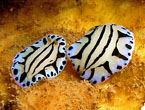| Home |
| Acknowledgments |
| Conventions |
| Glossary |
| Maps |
| References |
| Links |
| Articles |
| Thumbnails |
| Species
list |
| Family |
| Next
species |
Additional Photos

dusky rhinophores

underside

flattened posture

elongate posture

on food sponge

mating
_______________
GALLERY

Phyllidiopsis sphingis Brunckhorst, 1993

| Maximum size: 23 mm. Identification: The body of this species is white with three low, longitudinal ridges of tiny white tubercles. Two black lines run between the ridges. Another black line runs around the perimeter of the ridges. From this line, black rays extend to the mantle edge creating a scalloped pattern. The areas between these rays are suffused with brilliant, iridescent blue granules. The rhinophores vary from cream to tan. Natural history: Phyllidiopsis sphingis is a moderately common species found in shaded areas (such as the walls of caverns and under ledges) in moderately protected to highly exposed locations at depths of 5-20 m (16-66 ft). It may feed on a yellow sponge. (Note 1) Distribution: Big Island, Maui, Lanai, Oahu, Kauai and Niihau: widely distributed in the western & central Pacific. Taxonomic notes: The photo labeled Phyllidia nigra Pease, 1868c in Kay, 1979 appears to be of this species although the text probably refers to Phyllidiella rosans. It is listed as the "blue-black Phyllidia" in Bertsch and Johnson, 1981. Terry Gosliner suggested that the elongate, crawling animal (see photo) might be sufficiently different to justify listing as a separate species. (pers. com). However, we've opted to lump pending further work. It's also possible that all Hawaiian animals will prove distinct from other Indo-Pacific populations of P. sphingis. The elongate animal is listed as "Phyllidiopsis sp. 2" in Gosliner, et. al., 2008 and "Phyllidiopsis sp. 3" in Gosliner, et. al., 2018. The name is derived from the sphinx of Greek mythology. It is referred to as the "sphinx Phyllidia" in Hoover, 1998 & 2006. Photo: PF: 12 mm: inside Second Cathedral, Lanai; Oct. 16, 1987. Observations and comments: Note 1: This species has often been photographed on or near a bright yellow sponge but obvious feeding damage hasn't been noted. |
| Thumbnails |
Species
list |
Family | Next species | Top |